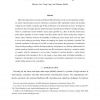Free Online Productivity Tools
i2Speak
i2Symbol
i2OCR
iTex2Img
iWeb2Print
iWeb2Shot
i2Type
iPdf2Split
iPdf2Merge
i2Bopomofo
i2Arabic
i2Style
i2Image
i2PDF
iLatex2Rtf
Sci2ools
116
click to vote
CORR
2010
Springer
2010
Springer
Randomized Lattice Decoding
Sphere decoding achieves maximum-likelihood (ML) performance at the cost of exponential complexity; lattice reduction-aided successive interference cancelation (SIC) significantly reduces the decoding complexity, but exhibits a widening gap to ML performance as the dimension increases. To bridge the gap between them, this paper presents randomized lattice decoding based on Klein's sampling technique, which is a randomized version of Babai's nearest plane algorithm (i.e., SIC). To find the closest lattice point, Klein's algorithm is used to sample some lattice points and the closest among those samples is chosen. Lattice reduction increases the probability of finding the closest lattice point, and only needs to be run once during pre-processing. Further, the sampling can operate very efficiently in parallel. The technical contribution of this paper is two-fold: we analyze and optimize the performance of randomized lattice decoding resulting in reduced decoding complexity...
Related Content
| Added | 09 Dec 2010 |
| Updated | 09 Dec 2010 |
| Type | Journal |
| Year | 2010 |
| Where | CORR |
| Authors | Shuiyin Liu, Cong Ling, Damien Stehlé |
Comments (0)

